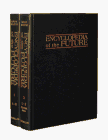Items related to Encyclopedia of the Future

The editors have assembled an impressive group of contributors, including John Naisbitt (Global Paradox), William F. Buckley, Jr. (Conservatism, Political), Joseph A. Califano (Health Care Costs), F. Wilfrid Lancaster (Libraries: Elelctronic Formats), and Ben Bova (Space Flight). Approaches vary. Some authors couch their sketches of the future in if-then qualifiers; others confidently lay out statements about what the future will be like. For example, the article United States says that "Soccer will eventually replace football as the national pastime" and "Liberal Judaism will wither, as American Jews become either wholly secular or join Orthodox renewal movements." Every article concludes with a bibliography. However, since most cited items deal with the present, they offer readers leads on sources that provide context for the topics but that will be of less help in judging the probable validity of an article's conclusions. Readers in coming years would do well to consult the Future Survey Annual (World Future Society, 1979--) for more up-to-date materials to supplement the articles.
Appendixes list the most influential futurologists, the most influential books about the future, and a fascinating chronology. This last records historical predictions for times past as well as yet to come and projects the future billions and billions of years ahead--including scientific and technological breakthroughs in the year 200,000 that allow Earth's inhabitants to extend the life of the Sun to 20 trillion years. The index differentiates main treatment of a topic from secondary discussion and, through its subdivision of topics, shows the interrelatedness of topics.
Accuracy is a bedrock criterion for judging reference books. However, in the case of this one-of-a-kind encyclopedia, readers will be able to judge better its accuracy as time passes. Twenty-five years hence some of it will look prescient, other parts of it perhaps comic, and certain portions still fantastic. But until then, it will stimulate thinking and provide a useful starting point for anyone contemplating the future of any of the topics it engages.
Copyright 1996 Reed Business Information, Inc.
"About this title" may belong to another edition of this title.
- PublisherMacmillan Library Reference
- ISBN 10 0028972058
- ISBN 13 9780028972053
- BindingHardcover
- EditorKurian George Thomas, Molitor Graham T. T.
Shipping:
US$ 5.00
Within U.S.A.
Top Search Results from the AbeBooks Marketplace
Encyclopedia of the Future Volume 1 & 2
Book Description Hardcover. Condition: Good-. 1996, includes Volume 1 & 2, ex library stamps, library bar code in rear, hard cover, slight edgewear, Vol. 1 has 1-531 pgs. and Vol. 2 has pgs. 533 - 1115. Book. Seller Inventory # 56370

